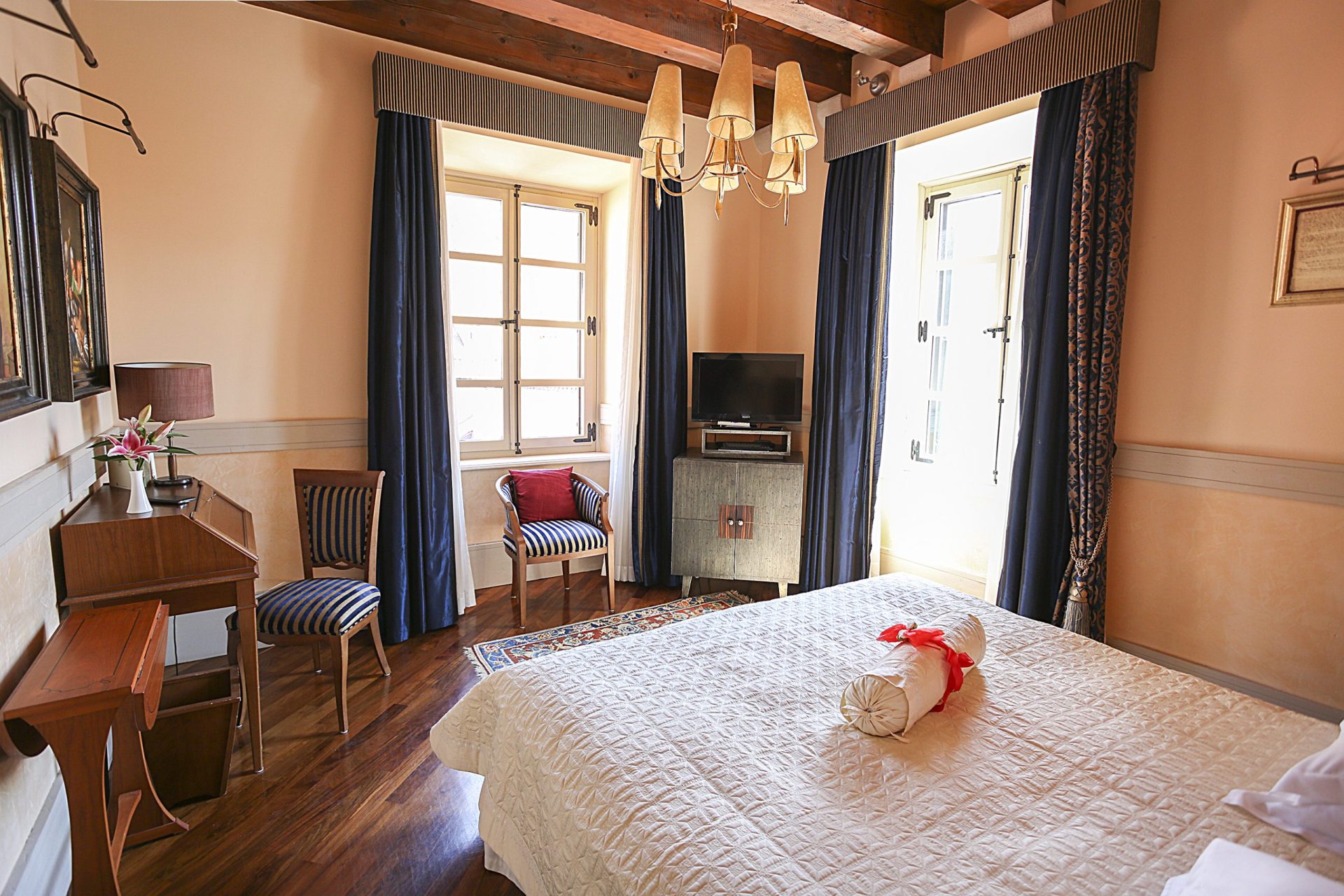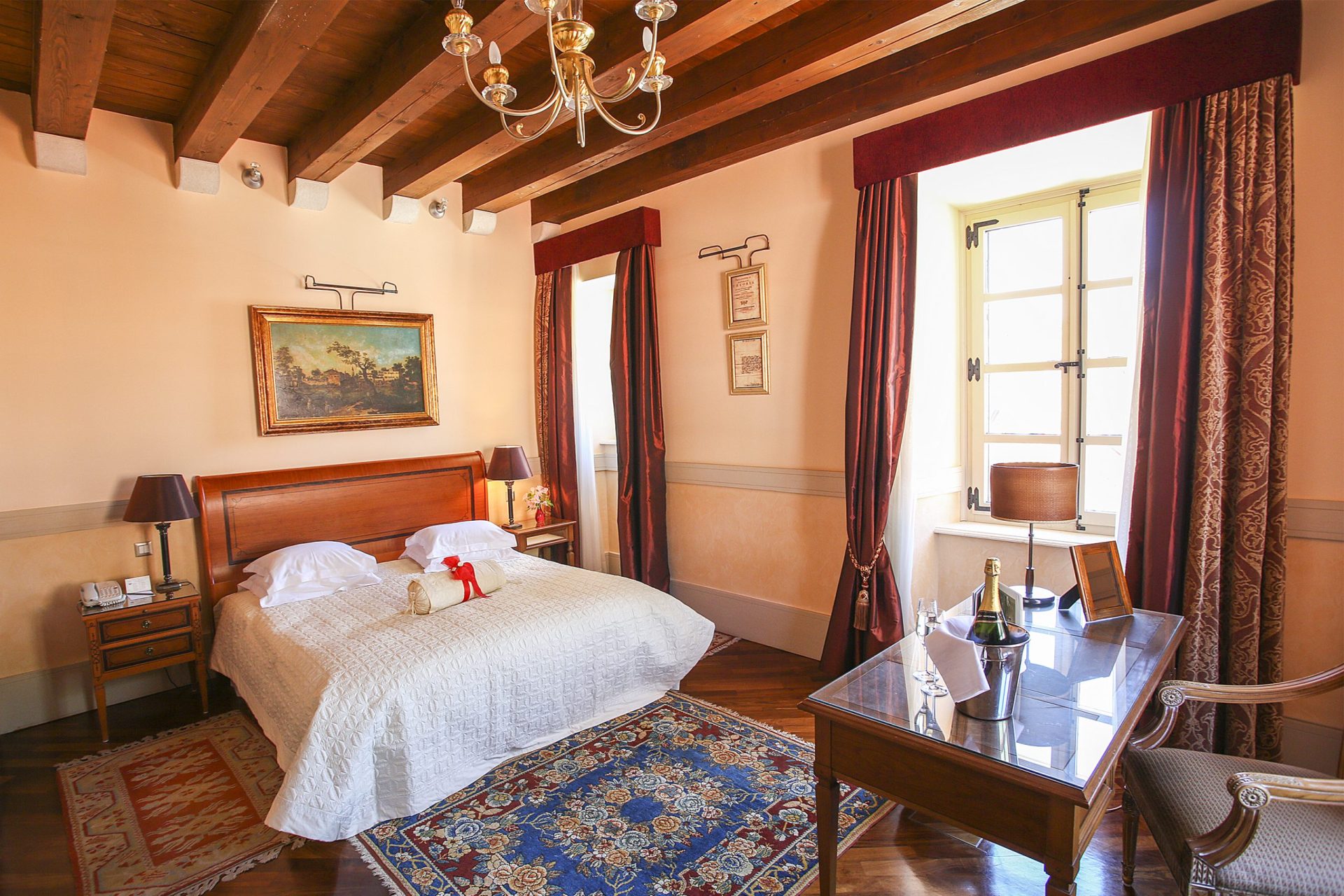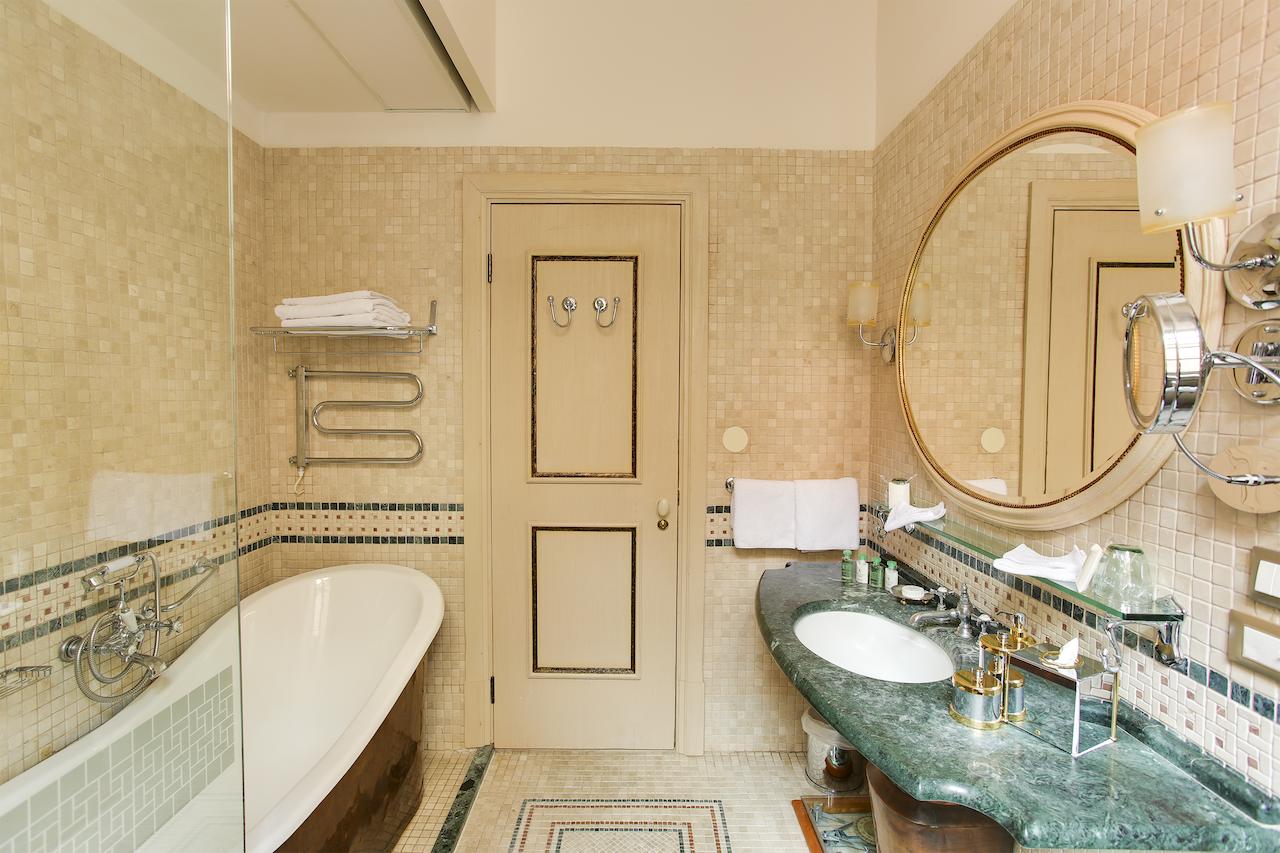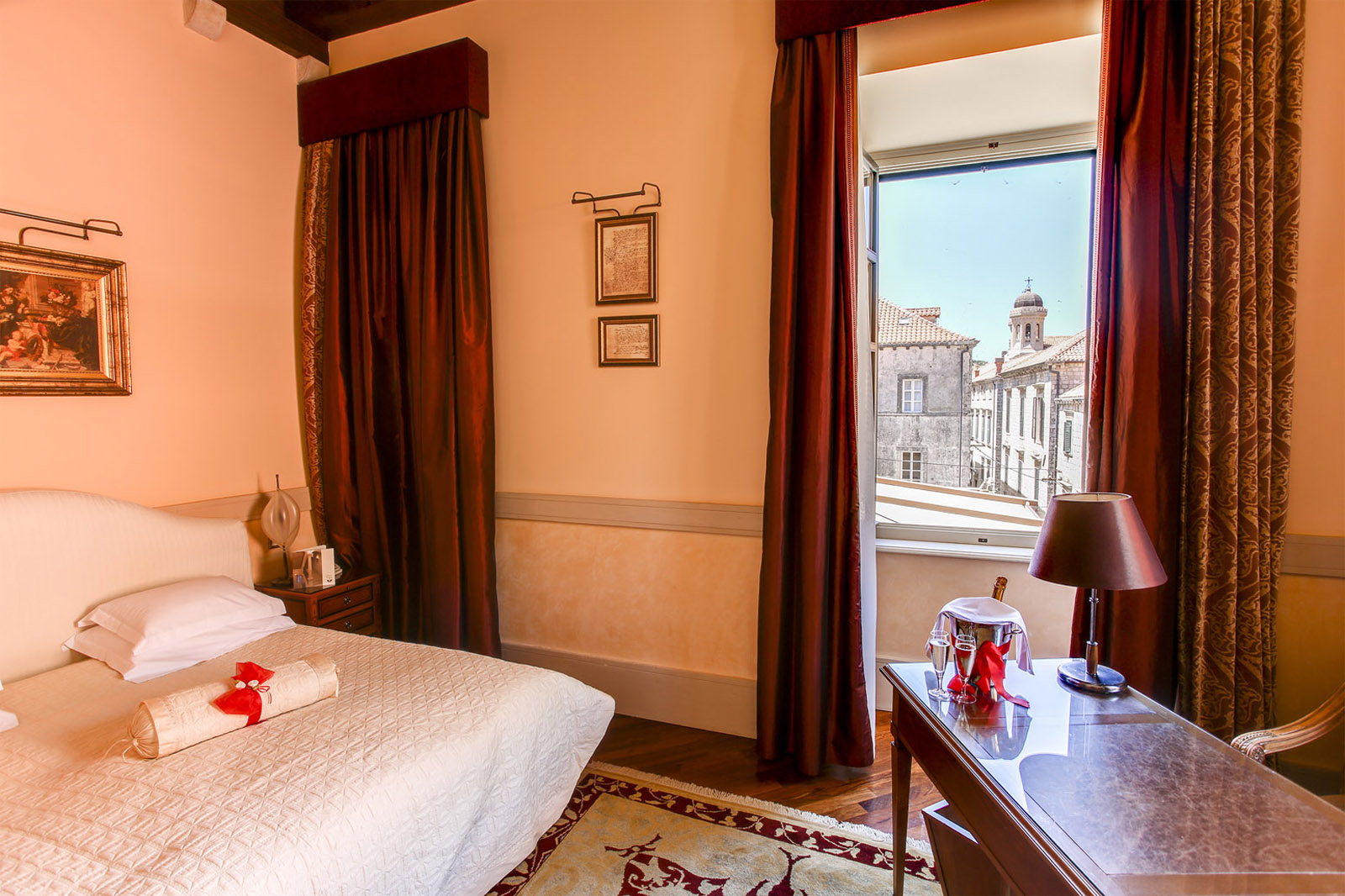Book your stay in The Pucić Palace
Corner Deluxe Room
Larger rooms with corner views and three windows offering breathtaking views of both city's central green market on the Gundulić square and pictoresque cobbled streets of the Old Town. Elegantly appointed with antique furnishings and modern amenities.
Our rooms and suites carry the names of the most famous citizens of Dubrovnik, as an homage to their spirit, and the living heritage they have bequeathed to the city.
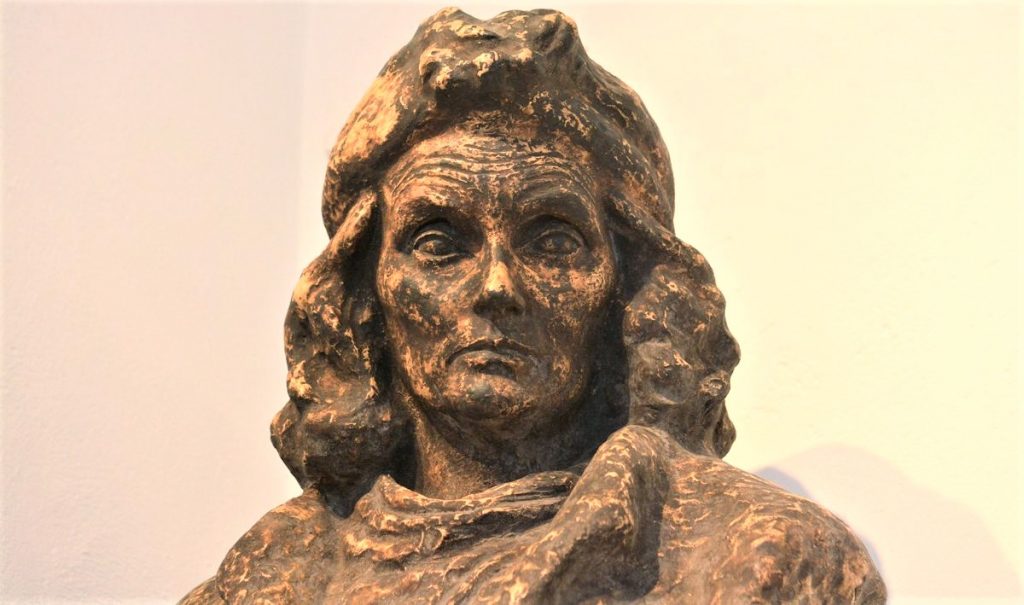
Marin Držić
Exuberant Spirit of Renaissance
Born into a large Dubrovnik family of good standing, that had already given one writer, Držić was trained and ordained as a priest — a calling that proved rather unsuitable to his rebel temperament. In 1538 Držić was sent to Sienna in Tuscany to study the Church Canon Law. Though his academic results were average, his extroverted and warm personality captured the hearts of his fellow students and professors, winning him the position of University Rector. Still, Držić found himself unsuited to the academic path and returned to the Dubrovnik Republic in 1543. Known for befriending vagabonds and adventurers, conspirators and outlaws, Držić earned his living as an interpreter, scrivener, and church musician. His resourcefulness earned him a telling nickname – otter. The legacy of Marin Držić is probably the finest renaissance literature oeuvres in Croatia. His pastorals and comedies are simply brimming with exuberant life, wit, and humor, celebrating love, liberty, and sincerity and mocking petty tyrants they are fresh and insightful today as they were centuries ago.
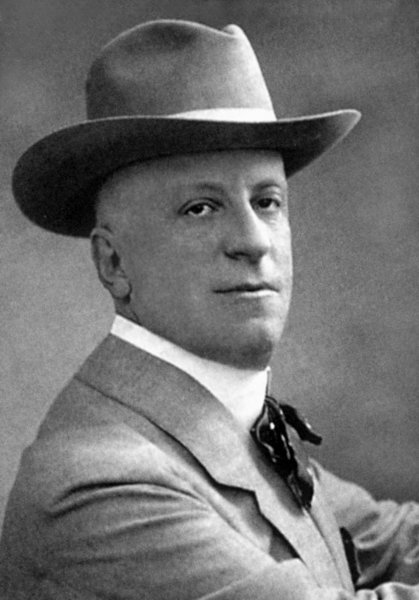
Ivo Vojnović
The Golden Leaves of Glorious Past
Famous Dubrovnik writer Ivo Vojnović was born in 1857 in Dubrovnik, at the time a part of the Austro-Hungarian Monarchy. His mother Maria de Serraglie was of noble Florentine descent, while his father Konstantin Vojnović was a descendant of the Serbian noble house Vojnović. Though he spent most of his childhood in Split and traveled widely, his birth city and its rich history always remained at the center of his literary work. A lawyer by vocation, Vojnović was the author of dramas of naturalistic cut, inspired by the literary and patriotic traditions of the Republic of Dubrovnik. He is most known for his 1902 play Dubrovnik Trilogy, one of the best and most beautiful Croatian dramas of all time. This dramatic triptych is woven with the symbolism laurel, artemisia, and heather – each an homage to Dubrovnik’s glorious past.
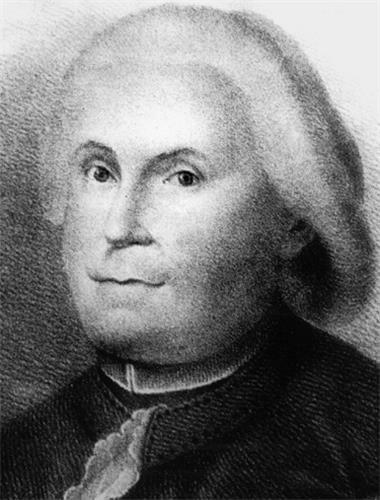
Benedikt Stay
Rhymed Mysteries of Cosmos
Benedetto Stay was a Dubrovnik clergyman and writer. Born in 1714, he was named after his grandfather, who was a painter. After attending Jesuit College in Dubrovnik, he studied mathematics, philosophy, and theology in Rome, where he got ordained and became a professor of rhetoric at Roman High Gymnasium and later on Vatican secretary for international correspondence. At the insistence of Pope Benedict XIV, he wrote two large philosophical poems. One of those expands tenets of Cartesian philosophy, while the other tackles Newton’s natural philosophy, including the reflections on ideas of famous Dubrovnik’s scientist Ruđer Bošković who accompanied Stay’s poem with his notes and examples of scientific problem-solving. Stay’s style was influenced by Rome’s Lucretius, for which reason he was often called Lucretius of the 18th century.
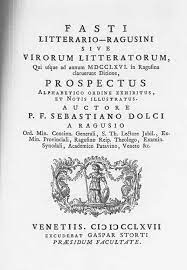
Sebastijan Slade
Fountain of Inspiration
Sebastiano Dolci was Dubrovnik theologian and historian. Born in 1699, he joined Franciscans at the young age of 14. As a linguist, he devoted lots of time to studying the Croatian language. His most famous work, Dubrovnik Literary Chronicle, presents as many as 271 writers from the Dubrovnik Republic – a testimony to prolific and lively literary production in this small, but world-famous medieval city-state, ever a spring of artistic inspiration. One of his religious epigrams contains the following verse: I am called the fountain, and yet I live on in the translucent waves flowing on forever.
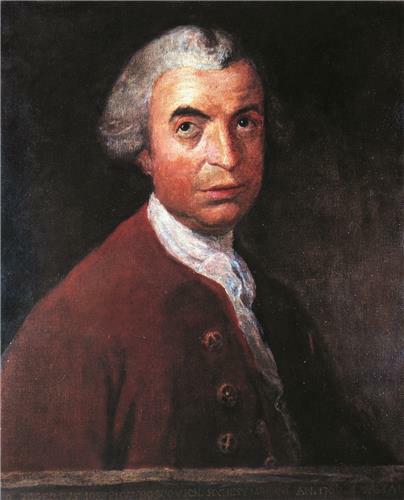
Ruđer Bošković
Invisible Force That Connects Us All
One of the most famous European scientists of his era, Ruđer Bošković was born in Dubrovnik in 1711. A brilliant polymath and a trained Jesuit, Ruđer Bošković made pivotal discoveries in many fields, including mathematics, mechanics, astronomy, geodesy, and optics. Bošković is recognized as the author of the precursor model to Bohr’s theory of atoms. Noble prize winner Werner Heisenberg called him Croatian Leibniz, while chemist Harold Hartley claimed Ruđer Bošković was one of the greatest intellectual figures of all ages. Nietzsche believed Bošković’s natural philosophy to be the greatest triumph over senses ever achieved on Earth. Tireless and brilliant in his scientific pursuits, yet humble in every respect, Bošković famously said: In comparison to entire nature, a speck of knowledge we acquired is less than a speck of dust compared to the visible universe.
Tomo Restić
Passionate Love of Music
One of the most famous Dubrovnik musicians and composers, Tomo Restić was also known as Tomasso Resti. Born in the Kingdom of Naples around 1770, in 1790 he moved to Dubrovnik, where he married and had a prolific music career spanning over 30 years. Documents from the Franciscan Musical Archives of Little Brethren reveal that Restić was often commissioned as a musician and composer and was referred to as maestro di capella. Versatile instrumentalist, Restić played organs in churches and viola in Rector’s Orchestra. He composed around 60 works, including masses and other church pieces, as well as secular arias, chamber music such as quartets, and one symphony. Restić dedicated one of his arias for voice and piano to Jelena Pucić Sorkočević, a noblewoman who happens to be the first female Croatian composer and who was revered for her dignity, elegance, and creative spirit.




